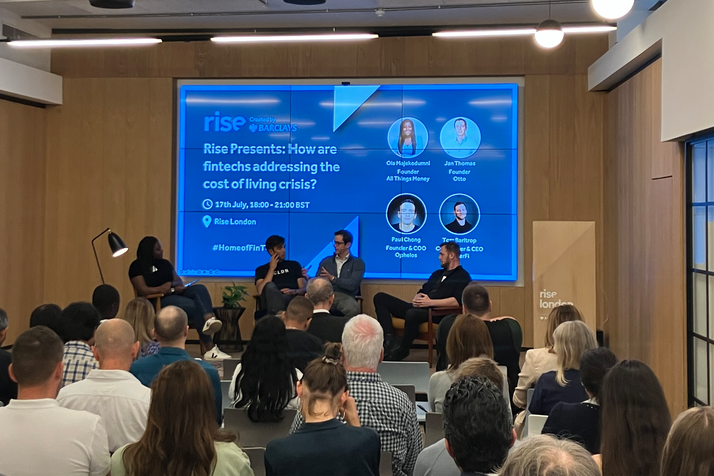The talk, aimed at and attended by 18-35-year-olds, addressed inflation and falling wages. It also touched on the Consumer Duty and regulation.
The cost of living crisis is so pervasive Gen Z has its own term for it: cozzie livs. Saving for a rainy day is becoming increasingly hard across the board. Lloyds reported last year that 80% of UK customers had less than £500 ($656) of savings in their current accounts.
Times have become exceptionally hard for younger people. Typically, younger demographics have been more hesitant to use traditional credit cards, but they are now increasingly lured into repayment schemes without fully understanding the consequences.
Buy now pay later
Tom Barltrop, CEO of SuperFi, decried the mass consumerism facilitated by buy now pay later (BNPL) offers.
He said: “33% of young people have fallen into debt by using BNPL products. Our research shows they have stayed on top of their finances, but low incomes combined with costs going up means it’s very hard for them to get out of that situation,” Barltrop said.
“33% of young people have fallen into debt by using BNPL products.”
Tom Barltrop, CEO, SuperFi
“You can buy a pizza in three payments. If you continue to buy on the borrow where the items are so small and perishable by nature, you lose track. Financial education is so important,” said Paul Chong, co-founder of Ophelos, a London-based debt collection startup. He wants to simplify, digitise, and automate the debt collection process using machine learning, while taking a compassionate approach to debtors.
Financial literacy
The speakers raised several bigger issues, such as the need to include financial literacy and fiscal education into the curriculum. There is hope that AI financial advisors can fill this void.
“I see huge scope for financial coaches at scale using generative AI. We have the opportunity to change how we think about financial education.”
Paul Chong, Co-Founder, Ophelos
“We haven’t managed to fix the problem of financial education in schools,” Chong said. “We’ve seen more advancement in six months than I saw in 10 years. Formerly only a company like Barclays could afford to do tech in that way. I would love everyone to have a personal financial coach, and we shouldn’t have to wait until people feel like they need that. I see huge scope for financial coaches at scale using generative AI. We have the opportunity to change how we think about financial education.”
Barltrop said: “On the consumer side, 70% of customers have tried budgeting tools, credit tracking apps, in the last 12 months, so the financial situation is forcing people to look at technology. There’s been a lot of innovation in the debt collection space.”
Criticism of regulators
The panel had plenty to say about the FCA. “You can’t just be forced by the regulator to do the right thing. That’s the advantage of fintechs – you can get ahead of the regulator. Now technology is far more open source, making it much easier for companies to establish themselves quicker,” Chong said.
“The biggest problem I have with the FCA is, there’s never anyone available to have these conversations.”
Paul Chong, Co-Founder, Ophelos
“When we started, we took the FCA seriously but we also took it as advice and guidance about how we should treat people. The biggest problem I have with the FCA is, there’s never anyone available to have these conversations,” he added. “I want to talk about how we’re solving these problems. The FCA has this desire to be a super regulator. Some of their rules are frankly archaic, but then there are archaic companies out there.”
Barltrop said: “All industries are realising they have a huge amount of vulnerable customers. Council tax arrears are around £4.4bn ($5.7bn), utility arrears are over £6bn ($7.9bn). In the financial sector, credit card companies write off £3m ($3.9m) a day. It’s a massive problem”.
Industries are working together on the 2025 Fintech Pledge. Supported by the UK government, one of the goals is that incumbents work together with startups to strengthen the UK’s financial ecosystem. The pledge says this “will ensure the UK is the best possible place to start and scale a financial services technology firm”.


